Hummus is a nutritious dip that pairs well with many dishes, but many people are unfamiliar with it. Today, we will answer all your questions about this delicious dip in the article below.
1 What is Hummus?
Hummus originates from the Middle East and Arab regions, with its main ingredients being cooked and blended with tahini (sesame paste), lemon juice, garlic, and olive oil.
 Chickpeas provide a good amount of protein in hummus.
Chickpeas provide a good amount of protein in hummus.
Per 100 grams of hummus, you get 214 calories and 10.71 grams of protein, along with other nutrients like healthy fats and vitamins from ingredients such as olive oil, garlic, and lemon juice (according to the United States Department of Agriculture). This makes hummus an excellent choice for those on a weight loss or clean eating diet, as it provides essential nutrients while keeping calories in check.
Anti-Inflammatory Properties
Hummus contains garlic, and especially olive oil, which are known for their anti-inflammatory properties (according to the National Center for Biotechnology Information). The sesame seeds in tahini also contribute to reducing inflammation due to the presence of sesamol and sesaminol, two powerful antioxidants that protect against harmful free radicals and have positive effects on health.
 Hummus contains anti-inflammatory compounds.
Hummus contains anti-inflammatory compounds.
High in Fiber
The fiber in hummus mainly comes from chickpeas. With 100 grams of hummus, you get 6 grams of fiber, which is a good portion of the daily recommended intake of fiber for women (24%) and men (16%) according to the National Center for Biotechnology Information. Fiber is essential for digestive health and can help prevent constipation and other issues.
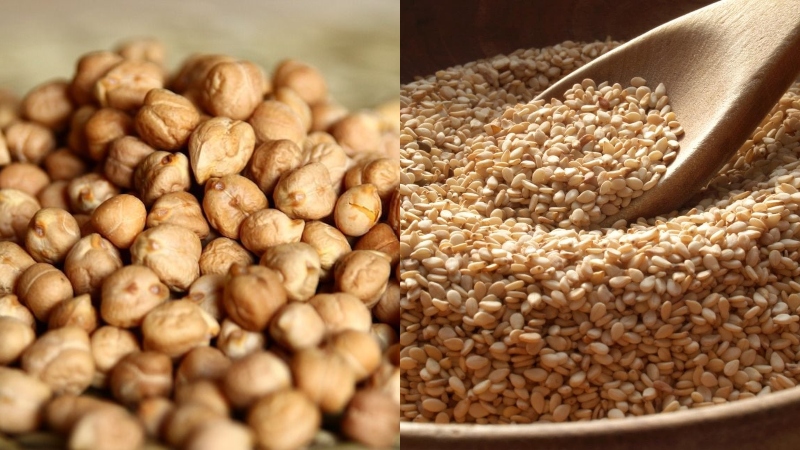 Chickpeas and sesame seeds in hummus provide a good amount of fiber.
Chickpeas and sesame seeds in hummus provide a good amount of fiber.
Additionally, the type of fiber found in sesame seeds has been shown to support digestive health, positively impact colon cells, and reduce the risk of certain cancers.
Helps Control Blood Sugar Levels
Hummus can help regulate blood sugar levels due to the low glycemic index of chickpeas and their high protein content. This combination helps balance blood sugar and reduces the risk of developing diabetes or insulin resistance (according to a 2020 study published in The Journal of Nutrition). The fiber in hummus also plays a role in slowing the digestion of carbohydrates, which helps maintain stable blood sugar levels.
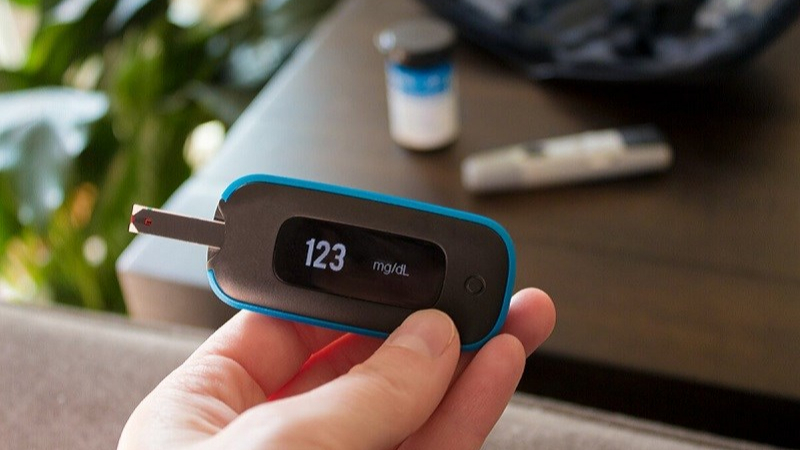 Hummus helps regulate blood sugar levels.
Hummus helps regulate blood sugar levels.
Reduces the Risk of Cardiovascular Disease
Olive oil, a key ingredient in hummus, is known for its cardiovascular benefits. It helps improve blood pressure, cholesterol levels, and reduces harmful triglycerides (according to MDPI). Additionally, chickpeas have been shown to support heart health due to their mineral content, including magnesium, potassium, and soluble fiber, which can help lower bad cholesterol levels (according to MDPI).
 Hummus helps reduce the risk of cardiovascular disease.
Hummus helps reduce the risk of cardiovascular disease.
Aids in Weight Loss and Maintaining a Healthy Weight
The high protein content in hummus helps slow digestion, keeping you feeling fuller for longer. Additionally, the fiber content helps curb hunger and reduce calorie intake, making it a great choice for those looking to lose weight or maintain a healthy weight (according to Medical News Today).
 Hummus can help with weight loss and maintaining a healthy weight.
Hummus can help with weight loss and maintaining a healthy weight.
Suitable for Those with Allergies
Hummus is a great option for those with gluten, nut, and dairy allergies, as it does not contain these common allergens. However, it’s important to read the ingredient list carefully to ensure there are no preservatives or other additives that may trigger allergies. Additionally, for those with irritable bowel syndrome (IBS), it’s advisable to consume hummus in moderation to avoid any potential digestive issues (according to NCBI).
 Hummus is a good choice for those with gluten, nut, and dairy allergies.
Hummus is a good choice for those with gluten, nut, and dairy allergies.
3 How to Use Hummus?
Hummus is a versatile dip that can be enjoyed by those on a vegetarian or clean eating diet. Here are some delicious ways to incorporate hummus into your meals:
Sandwiches
Spread some creamy hummus on fresh, green sandwiches, or toast, and add some crunchy vegetables like bell peppers or cucumbers. It’s a simple yet tasty breakfast option.
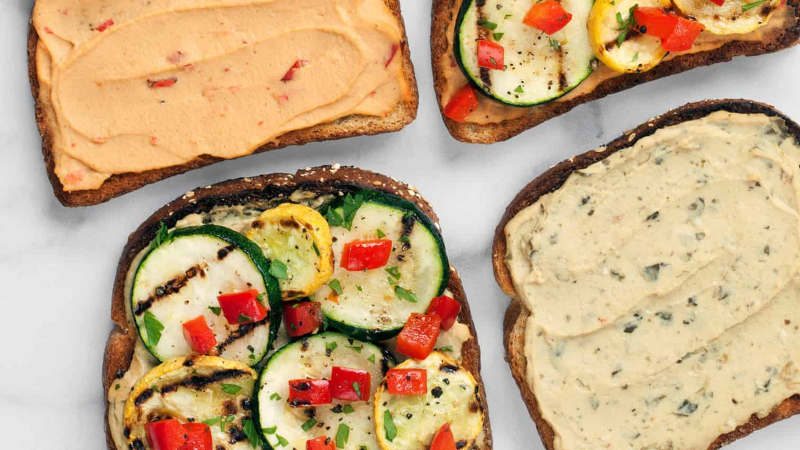 Hummus goes well with sandwiches for a tasty breakfast.
Hummus goes well with sandwiches for a tasty breakfast.
Pizza
Instead of using tomato sauce on your pizza base, try spreading some hummus. The unique flavor and creamy texture of hummus will give your pizza a delicious twist.
 Use hummus instead of tomato sauce on your pizza for a unique flavor.
Use hummus instead of tomato sauce on your pizza for a unique flavor.
Salads
Give your salad a flavorful boost by adding hummus! The creamy texture of hummus blends beautifully with fresh, green vegetables, making your salad more appealing and delicious.
 Hummus adds a creamy twist to your salad.
Hummus adds a creamy twist to your salad.
Pita Bread
For a quick and tasty breakfast, dip some pita bread (a flatbread similar to a pizza base) into creamy hummus. It’s a simple yet satisfying way to start your day.
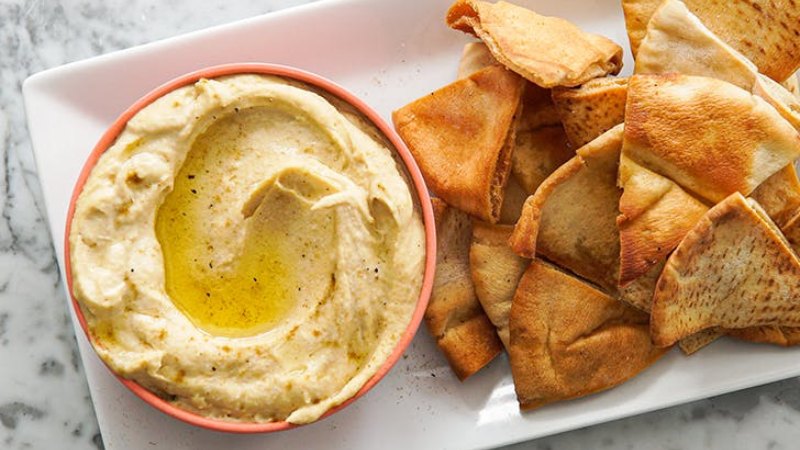 Pita bread and hummus make a great breakfast combination.
Pita bread and hummus make a great breakfast combination.
Steamed or Raw Vegetables
Cut up or steam some fresh vegetables and dip them into hummus for a healthy and nutritious snack. It’s a great way to get your daily dose of veggies while enjoying a delicious dip.
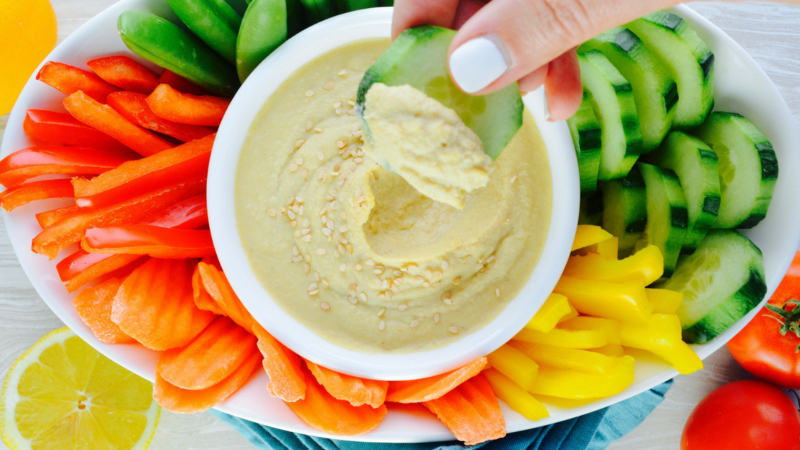 Dip steamed or raw vegetables into hummus for a healthy snack.
Dip steamed or raw vegetables into hummus for a healthy snack.
French Fries
Try something different with your French fries! Dip them into hummus instead of the usual sauces. The creamy, nutty flavor of hummus pairs amazingly well with crispy fries.
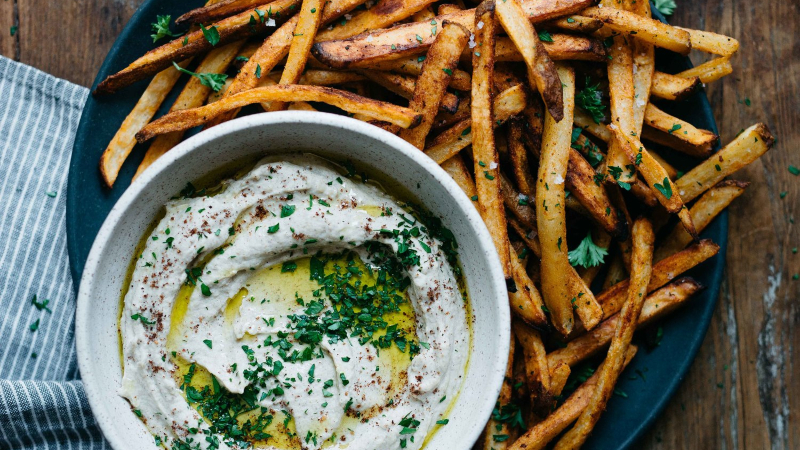 Hummus and French fries are a match made in heaven.
Hummus and French fries are a match made in heaven.
We hope this article has given you a better understanding of hummus and how to incorporate it into your meals. Enjoy exploring the delicious world of hummus!







































